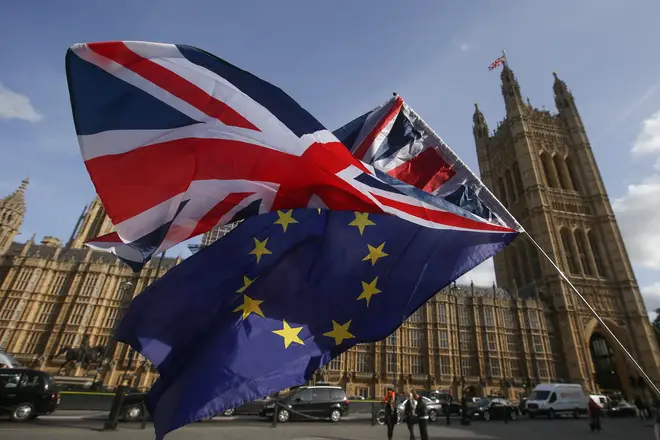
Nick Abbot 10pm - 1am
1 April 2019, 15:28 | Updated: 1 April 2019, 16:59
MPs will tonight be voting in their second round of indicative votes as they try to form a consensus on how to resolve the Brexit impasse.
The first set of indicative votes resulted with all eight options being rejected, and so MPs try to break the deadlock by holding a second vote.
Today's indicative votes, a non-legally binding way of gathering consensus amongst MPs, is expected at around 8pm tonight.
But what are MPs voting on?
These are the amendments chosen by the Speaker to be included in the indicative votes:
(C) Customs Union
Put forward by the father of the house Ken Clarke, the proposal is for a commitment to negotiate a "permanent and comprehensive UK-wide customs union with the EU" at minimum.
This option was defeated by the small margin of six last week, with MPs voting against it by 271 to 265.
(D) Common Market 2.0
Originally defeated by 283 votes to 189, the motion for UK membership of the European Free Trade Association (EFTA) and European Economic Area (EEA) would allow continued participation in the single market and a "comprehensive customs arrangement" with the EU.
(E) Confirmatory public vote
The motion that says the government cannot implement or ratify the withdrawal agreement and the political declaration unless and until it has been put back to the people and approved in a second referendum.
It was originally defeated by 295 votes to 268.
(G) Parliamentary Supremacy
Moved by SNP MPs, this motion has three parts.
Firstly, if a withdrawal agreement can not be passed, it calls for the government to seek a further extension to Article 50.
Secondly, if an extension is not possible, then the plan would turn to MPs to decide between no-deal or revoking Article 50 altogether.
And if MPs reject no-deal at this point, then the UK would have to stop Brexit and an inquiry will be held to determine what kind of future relationship with the EU would likely to have the most support in the UK.
The plan was defeated 293 votes to 184 last week.

Indicative votes are a way of testing whether there is a majority in the House of Commons for different options relating to one issue.
They are happening because parliament voted to secure parliamentary time for debate - which is usually controlled by the government.
Asides from the indicative votes last week on similar Brexit options, yes.
The last time indicative votes were held was in 2003, when MPs voted on a number of different options on a reformed House of Lords.
However, the Commons ended up voting for two different options which were mutually exclusive but each claimed to be the way forward. It meant the status quo prevailed as the reforms were not passed.
“I don’t think it’s the silver bullet some people think it is,” Mr Wilson said of indicative votes.
A) Unilateral right of exit from backstop
Conservative backbenchers have proposed that Parliament gets behind Theresa May's Brexit deal only if it is amended to allow the UK to unilaterally end the Irish border backstop.
MPs did not vote on this option last week, but the EU has said that the backstop is not open for renegotiation.
(B) No deal in the absence of a Withdrawal Agreement
This is a motion calling on MPs to support leaving the EU without a deal on April 12th.
A similar motion was rejected last week in the first round of indicative votes, which was defeated by 400 votes against to 160.
(F) Public vote to prevent no deal
In the event that the UK is looking like it might leave the EU without a deal, this motion suggests holding a referendum in a bid to prevent no-deal Brexit.
(H) Efta and EEA
A motion tabled by Conservative MP George Eustice - who quit as agriculture minister this month to fight for Brexit - proposes remaining within the EEA and rejoining EFTA, but remaining outside a customs union with the EU.